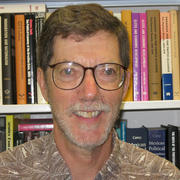In Memoriam: Joel Fred Sherzer
Joel Sherzer, Professor Emeritus of Anthropology, died peacefully on the morning of November 6, 2022. The cause was complications from Parkinson’s disease, according to his widow, Dr. Dina Sherzer. He was 80. In addition to Dina Sherzer, he is survived by his brother William “Billy” Sherzer.
Joel Fred Sherzer was born on March 18, 1942, in Philadelphia, PA. His scholarly career straddled the disciplines of anthropology and linguistics. A prolific author and researcher, beloved professor, mentor, and friend, Sherzer is best known for his work on the language and culture of the Guna Peoples (known prior to 2010 as Kuna) in Panama. His ethnographic and linguistic work was deposited as the Kuna Collection of Joel Sherzer in the Archive of the Indigenous Languages of Latin America (AILLA), a digital repository he co-founded in 2000. He is also well known as one of the founders of UT's vibrant and longstanding strength in linguistic anthropology, and as a proponent of the view that culture centers around speech play and verbal art, known as his discourse-centered approach to language and culture.
Sherzer grew up in Philadelphia and graduated from Central High School. He attended Oberlin College, where he majored in French and Spanish, graduating in 1964. It was during his senior year at Oberlin that he met Dina Marin, a Fulbright scholar who was working as a French assistant. The two were married later that year in Mexico City.
After college, Sherzer pursued his interest in languages and linguistics during two summer programs: funded by a Fulbright fellowship, he studied Nahuatl at the Universidad Nacional Autónoma de México in Mexico City with Miguel León-Portilla and Morris Swadesh in 1964; at the University of California Los Angeles, he attended the Linguistic Society of America Summer Institute in 1966. He began graduate work in linguistics at the University of Pennsylvania in 1965 with a Woodrow Wilson fellowship, completing his doctorate in 1968. His dissertation, titled “An Areal-Typological Study of the American Indian Languages North of Mexico,” was published as a book in 1976.
In April 2014, The Linguist List published Sherzer’s short essay “How I Became a Linguist.” Here, Sherzer recalled his interdisciplinary graduate education, writing, “I was fortunate to study and interact with a creative, dynamic, and pioneering group of people in various departments. The work of my Penn teachers has remained with me all of my scholarly life. Along with others, I frequently crossed the street between the anthropology and linguistic departments.” He cited Henry Hoenigswald, Dell Hymes, J. David Sapir, Erving Goffman, and William Labov for their influence on his development as a linguist.
More information about Joel and the memorial service can be found at https://ailla.utexas.org/node/233

